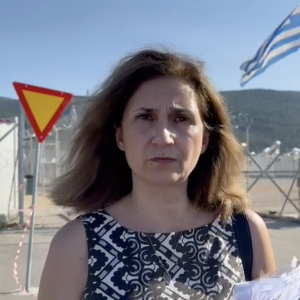What I learned from survivors of the migrant boat disaster
On Wednesday, June 14, 2023, a boat carrying migrants capsized off the coast of Greece. It is likely that hundreds of people have died in the migrant boat disaster in Greece, with it being considered one of the worst Mediterranean Sea disasters in recent history. Maria Papamina, a lawyer and Legal Unit Coordinator with the Greek Council for Refugees (GCR), which is a partner organization of Save the Children, is providing legal assistance to survivors at the Malakasa refugee camp in southern Greece.

The following is her account of the survivors’ stories.
We have been visiting and talking to approximately 35 to 40 survivors, all of them young men, most in their early 20s. Half of them are Syrians, there are a few Palestinians, and the rest are from Egypt and Pakistan.
Many survivors have families in the EU, and most of them were talking about trying to reunite with their parents, siblings, aunts and uncles.
Most of our conversations and interviews with the survivors were about what they experienced on board and the circumstances of the shipwreck.
Even before boarding the ship, the smugglers didn’t allow the refugees to bring baggage, food, or water. After the first day, they ran out of water and had to drink seawater. According to the testimonies we heard, at least two people died from thirst.
The refugees were not allowed to go to another level of the boat unless they paid €50. The smugglers were controlling and did not allow anyone to stand up or walk around.
People from Pakistan were in the most difficult situation because they were forced to stay on the lower level of the ship with the refrigerators. On the lower level, there weren’t many windows, so there wasn’t any clean air.
Some of the survivors we spoke to said there were several very young men from Pakistan on this lower level of the ship. On the second level, there were around 20–25 women and young children, even babies.
Survivors told us the Greek coast guard initially went near the boat. The boat was encouraged to follow the coast guard vessel and after a while, the coast guard threw a rope to be tied to the boat. After a few seconds the rope was cut.
Then there was a second attempt with another rope. After it was tied to the boat, the coast guard started towing. Most of the survivors we’ve spoken to mentioned this. Some said that the towing lasted from three to 10 minutes.
During the towing, the coast guard changed directions, first to the right and then to the left. This caused the boat to start losing balance, and then the boat started sinking.
The survivors had difficulty talking about what happened. Some didn’t want to talk at all and were in shock. Many have lost family members on board, mostly cousins.
One story stood out. We spoke to someone from Pakistan who tried to save his best friend as the ship was sinking, but he was unsuccessful. He’s devastated and he’s the only survivor we spoke to who wants to return home.
I was informed there were seven unaccompanied children among the survivors, five from Syria and two from Pakistan. They were immediately transferred to a facility for minors. We haven’t heard of any women who survived.
It’s a great tragedy. We’re talking about a huge number of people who are missing. The survivors should be able to be with their relatives in other European countries through family reunification or relocation mechanisms. European countries must address this tragedy, not just Greece.
This tragedy must make Europe respond to the needs of people seeking protection and safety immediately. Also, there is a responsibility of Europe to protect human lives and dignity, and stop endangering people with deterrent policies and expulsion operations.
We can’t go on like this. Europe must ensure that legal and safe passages are in place for refugees and migrants to access EU territory.
—————-
Save the Children is calling for a full, independent investigation of the incident to determine the events that resulted in the boat sinking and the reactions of the Greek coast guard and Frontex, the EU’s border agency to this migrant boat disaster.
Millions of children and their families make the dangerous journey via sea, fleeing violence in their home country with hopes for a better future. Right now, the world is experiencing record high numbers of forcibly displaced people – 110 million, to be exact.
All children fleeing conflict, hunger, or persecution must be offered safe and legal routes to safety, protection, and support to rebuild their lives.
Click here to learn more about Save the Children’s response in emergency situations across the globe.


